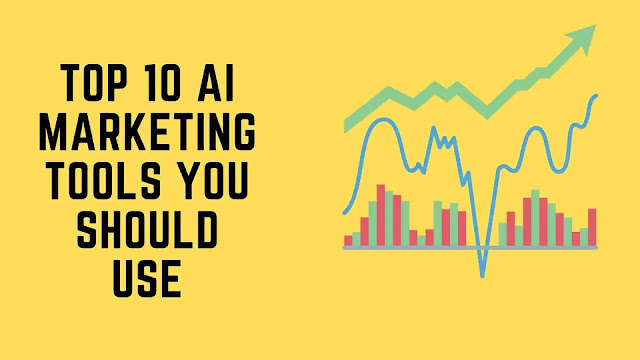 |
The marketing industry is turning to artificial intelligence (AI) as a way to save time and execute smarter, more personalized campaigns. 61% of marketers say AI software is the most important aspect of their data strategy.
If you’re late to the AI party, don’t worry. It’s easier than you think to start leveraging artificial intelligence tools in your marketing strategy. Here are 10 AI marketing tools every marketer should start using today.
1. Personalize
Personalize is an AI-powered technology that helps you identify and produce highly targeted sales and marketing campaigns by tracking the products and services your contacts are most interested in at any given time. The platform uses an algorithm to identify each contact’s top three interests, which are updated in real-time based on recent site activity.
Key Features
- Identifies top three interests based on metrics like time on page, recency and frequency of each contacts
- Works with every ESP and CRM
- Easy to get up and running in days
- Enterprise-grade technology at a low cost for SMBs
2. Seventh Sense
Seventh Sense provides behavioral analytics that help you win attention in your customers’ overcrowded email inboxes. Choosing the best day and time to send an email is always a gamble. And while some days of the week generally get higher open rates than others, you’ll never be able to nail down a time that’s best for every customer. Seventh Sense eases your stress of having to figure out the perfect send-time and day for your email campaigns. The AI-based platform figures out the best timing and email frequency for each contact based on when they’re opening emails. The tool is primarily geared toward HubSpot and Marketo customers
Key Features
- AI determines the best send-time and email frequency for each contact
- Connects with HubSpot and Marketo
3. Phrasee
Phrasee uses artificial intelligence to help you write more effective subject lines. With its AI-based Natural Language Generation system, Phrasee uses data-driven insights to generate millions of natural sounding copy variants that match your brand voice. The model is end-to-end, meaning when you feed the results back to Phrasee, the prediction model rebuilds so it can continuously learn from your audience.
Key Features
- Instantly generates millions of human-sounding, brand-compliant copy variants
- Creates tailored language models for every customer
- Learns what your audience responds to and rebuilds the prediction model every time
4. Hubspot Seo
HubSpot Search Engine Optimization (SEO) is an integral tool for the Human Content team. It uses machine learning to determine how search engines understand and categorize your content. HubSpot SEO helps you improve your search engine rankings and outrank your competitors.Search engines reward websites that organize their content around core subjects, or topic clusters. HubSpot SEO helps you discover and rank for the topics that matter to your business and customers.
Key Features
- Helps you discover and rank for topics that people are searching for
- Provides suggestions for your topic clusters and related subjects
- Integrates with all other HubSpot content tools to help you create a well-rounded content strategy
5. Evolve AI
When you’re limited to testing two variables against each other at a time, it can take months to get the results you’re looking for.Evolv AI lets you test all your ideas at once. It uses advanced algorithms to identify the top performing concepts, combine them with each other, and repeat the process to achieve the best site experience.
Key Features
- Figures out which content provides the best performance
- Lets you test multiple ideas in a single experiment instead of having to perform many individual tests over a long period of time
- Lets you try all your ideas across multiple pages for full-funnel optimization
- Offers visual and code editors
6. Acrolinx
Acrolinx is a content alignment platform that helps brands scale and improve the quality of their content. It’s geared toward enterprises – its major customers include big brands like Google, Adobe and Amazon – to help them scale their writing efforts. Instead of spending time chasing down and fixing typos in multiple places throughout an article or blog post, you can use Acrolinx to do it all right there in one place. You start by setting your preferences for style, grammar, tone of voice and company-specific word usage. Then, Acrolinx checks and scores your existing content to find what’s working and suggest areas for improvement. The platform provides real-time guidance and suggestions to make writing better and strengthen weak pages.
Key features
- Reviews and scores existing content to ensure it meets your brand guidelines
- Finds opportunities to improve your content and uses automation to shorten your editorial process.
- Integrates with more than 50 tools and platforms, including Google Docs, Microsoft Word, WordPress and most web browsers.
7. MarketMuse
MarketMuse uses an algorithm to help marketers build content strategies. The tool shows you where to target keywords to rank in specific topic categories, and recommends keywords you should go after if you want to own particular topics. It also identifies gaps and opportunities for new content and prioritizes them by their probable impact on your rankings. The algorithm compares your content with thousands of articles related to the same topic to uncover what’s missing from your site.
Key features:
- The built-in editor shows how in-depth your topic is covered and what needs improvement
- Finds gaps and opportunities for new content creation, prioritized by their probable impact and your chance of ranking
8. Copilot
Copilot is a suite of tools that help ecommerce businesses maintain real-time communication with customers around the clock at every stage of the funnel. Promote products, recover shopping carts and send updates or reminders directly through Messenger.
Key features:
- Integrate Facebook Messenger directly with your website, including chat history and recent interactions for a fluid customer service experience
- Run drip messenger campaigns to keep customers engaged with your brand
- Send abandoned cart, out-of-stock, restock, preorder, order status and shipment notifications to contacts
- Send branded images, promotional content or coupon codes to those who opt in
- Collect post-purchase feedback, reviews and customer insight
- Demonstrate social proof on your website with a widget, or push automatic Facebook posts sharing recent purchases
- Display a promotional banner on your website to capture contacts instantly
9. Yotpo
Yotpo’s deep learning technology evaluates your customers’ product reviews to help you make better business decisions. It identifies key topics that customers mention related to your products—and their feelings toward them. The AI engine extracts relevant reviews from past buyers and presents them in smart displays to convert new shoppers. Yotpo also saves you time moderating reviews. The AI-powered moderation tool automatically assigns a score to each review and flags reviews with negative sentiment so you can focus on quality control instead of manually reviewing every post.
Key features:
- Makes it easy for shoppers to filter reviews and find the exact information they’re looking for
- Analyzes customer feedback and sentiments to help you improve your products
- Integrates with most leading ecommerce platforms, including BigCommerce, Magento and Shopify.
10. Albert AI
Albert is a self-learning software that automates the creation of marketing campaigns for your brand. It analyzes vast amounts of data to run optimized campaigns autonomously, allowing you to feed in your own creative content and target markets, and then use data from its database to determine key characteristics of a serious buyer. Albert identifies potential customers that match those traits, runs trial campaigns on a small group of customers—with results refined by Albert itself—before launching it on a larger scale.
Albert plugs into your existing marketing technology stack, so you still have access to your accounts, ads, search, social media and more. Albert maps tracking and attribution to your source of truth so you can determine which channels are driving your business.
Key features:
- Breaks down large amounts of data to help you customize campaigns
- Plugs into your marketing technology stack and can be used across diverse media outlets, including email, content, paid media and mobile
Final Saying
There are many tools and companies out there that offer AI tools, but this is a small list of resources that we have found to be helpful. If you have any other suggestions, feel free to share them in the comments below this article. As marketing evolves at such a rapid pace, new marketing strategies will be invented that we haven’t even dreamed of yet. But for now, this list should give you a good starting point on your way to implementing AI into your marketing mix.






